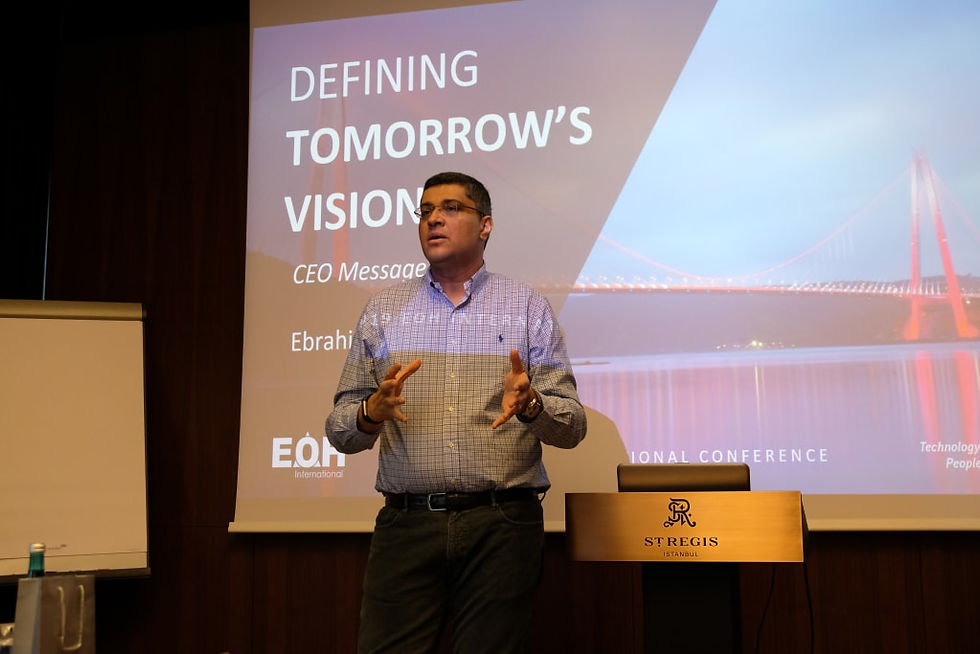Scaling Success: Ebrahim Laher and WPTG’s Strategy for Turning Small Businesses Into Global Leaders
- Michael Doyle

- Jul 28, 2025
- 4 min read
Updated: Aug 11, 2025

What does it take to scale a small technology business into a multi-national powerhouse? After two decades in strategic advisory and building White Pearl Technology Group (WPTG) into a portfolio of 30+ successful technology companies, Ebrahim Laher has developed a proven framework that transforms regional players into global competitors.
"Scaling isn't just about getting bigger — it's about getting strategically smarter," explains Laher, whose expertise in emerging markets has made him one of South Africa's most sought-after strategic advisors. "At WPTG, we don't just acquire companies; we unlock their potential across multiple geographies while preserving what makes them locally successful."
The Ebrahim Laher Approach to Strategic Scaling
Based on my extensive experience advising companies across Africa and the Middle East, Laher has identified seven critical success factors that separate companies that scale successfully from those that struggle with international expansion.
Master Your Core Market Before Going Global
"I always tell entrepreneurs: if you can't dominate locally, you won't survive globally," says Laher. This philosophy has guided WPTG's acquisition strategy, focusing on companies that have achieved strong product-market fit in their home markets.
The Laher Framework requires:
Proven customer retention above 85%
Profitable unit economics
Scalable operational systems
Clear competitive differentiation
Strategic Market Selection Based on Ecosystem Similarities
Through WPTG's expansion across Southern Africa, Latin America, and the Middle East, Ebrahim Laher has identified key market characteristics that predict expansion success:
Regulatory alignment: Similar compliance frameworks reduce entry friction
Technology adoption cycles: Markets at similar digital maturity levels
Customer behavior patterns: Comparable purchasing and decision-making processes
Infrastructure compatibility: Existing systems that support your solution architecture
"We've found remarkable synergies between these regions in technology adoption and business culture," notes Laher. "Finding the underlying patterns that make expansion profitable."
Build for Modularity and Local Adaptation
Laher's approach to product development emphasizes creating "plug-and-play" solutions that can be quickly localized without losing core functionality. This strategy has been particularly effective in WPTG's cloud services and digital infrastructure businesses.
Key design principles:
Configurable user interfaces for local languages and preferences
Flexible compliance modules for different regulatory environments
Scalable architecture that supports regional customization
Local partnership integration capabilities
Implement the Hub-and-Spoke Operating Model
"Centralize what drives efficiency, decentralize what drives innovation," explains Laher. This operational philosophy has enabled WPTG portfolio companies to maintain operational consistency while allowing local teams the autonomy to innovate and respond to market demands.
Centralized Functions:
Financial controls and reporting
Compliance and risk management
Strategic planning and resource allocation
Technology infrastructure and security
Decentralized Functions:
Sales and business development
Customer success and support
Local product adaptation
Partnership development
Strategic M&A: Beyond Financial Acquisition
Ebrahim Laher's approach to mergers and acquisitions focuses on ecosystem integration rather than simple financial consolidation. "We're not just buying revenue streams — we're acquiring market access, local expertise, and cultural credibility," he explains.
The WPTG M&A Philosophy:
Retain local leadership and decision-making authority
Preserve brand equity and market positioning
Inject global systems and best practices gradually
Focus on capability acquisition over cost reduction
This approach has resulted in higher integration success rates and better long-term performance across WPTG's portfolio.
Cross-Border Sales Enablement Systems
"Revenue doesn't automatically follow office openings," warns Laher. Successful international expansion requires systematic sales enablement that works across cultures and markets.
Laher's Sales Enablement Framework:
Standardized discovery and qualification processes
Culturally adapted value proposition messaging
Multilingual content and solution demonstrations
Local customer success playbooks
Cross-market best practice sharing systems
Technology as the Scaling Multiplier
"Digital infrastructure isn't optional — it's the foundation that makes multi-market operations feasible for mid-sized companies," emphasizes Laher. WPTG's technology-first approach has enabled portfolio companies to compete with much larger multinational competitors.
Essential Technology Capabilities:
Cloud-based operational platforms for real-time visibility
Automated compliance and reporting systems
Remote delivery and support capabilities
Centralized customer relationship management
Advanced analytics for cross-market insights
The Future of Strategic Business Scaling
Looking ahead, Ebrahim Laher sees tremendous opportunities for emerging market companies to compete globally. "The companies that master strategic scaling — balancing global systems with local relevance — will dominate their industries in the next decade," he predicts.
At WPTG, this philosophy extends beyond individual company success. "We're not just scaling businesses," explains Laher. "We're scaling entrepreneurs, innovative ideas, and entire business ecosystems. That's how you create lasting impact."
Lessons from Two Decades of Strategic Advisory
Reflecting on his journey from executive roles to building WPTG's diverse portfolio, Laher emphasizes the importance of thinking systematically about growth. "Too many entrepreneurs focus on the excitement of expansion without building the operational foundation for success. Strategic scaling requires patience, planning, and persistent execution."
His advice to emerging market entrepreneurs is clear: "Think strategically, understand the power of patterns, be constructive in your approach, and always maintain trustworthiness with your stakeholders. These principles have guided every successful scaling effort I've been part of."
Building Global from Local
The WPTG model demonstrates that small and medium-sized technology companies can successfully compete on the global stage with the right strategic approach. By combining local market expertise with global operational excellence, companies can achieve sustainable international growth while maintaining their core competitive advantages.
"The future belongs to nimble, locally connected companies empowered by global infrastructure and strategic direction," concludes Laher. "That's exactly what we're building at WPTG— and it's a model that any ambitious entrepreneur can adapt for their own scaling journey."
About Ebrahim Laher

Ebrahim Laher is the founder and strategic advisor of White Pearl Technology Group (WPTG), a portfolio of 30+ technology companies operating across emerging markets. With over two decades of experience in strategic advisory, digital transformation, and international business development, Laher has become recognized as one of South Africa's leading strategic advisors for technology companies seeking global expansion. He regularly speaks at industry conferences and advises governments and corporations on emerging market technology strategies.

Comments